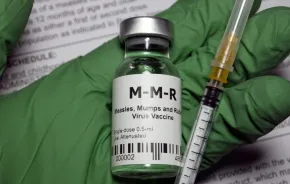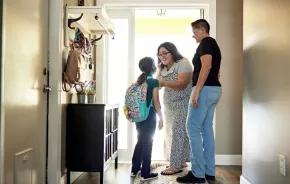Election year is a great time for kids to learn about politics — but that learning shouldn’t be confined to the classroom. Experts say that when political issues are talked about both at school and at home, it has a lasting impact on future voters.

Getting informed
“Start with simple concepts children can understand,” says Fran O’Malley, curriculum specialist for the Democracy Project at the University of Delaware. “Ask, ‘Who are the leaders or authority figures in our home? Our community? What kinds of jobs do they do?’ As children enter school, initiate conversations based on what they are learning in history or government class and go from there.”
This, she says, is all part of a process that instills concepts and can be built upon over time. Richard Coe, representative for Kids Voting U.S.A., agrees. “Talk with children about how government affects them right now through everyday things like safety regulations on water, mattresses and toys. Or money needed to make libraries and parks better,” says Coe, whose nonpartisan organization works to educate and engage future voters. “If you find that point of relevance and are consistent with these types of conversations, most kids will take an interest.”
That’s how Jeffery Sullivan got involved in politics. While still in elementary school, he developed a mentoring relationship with a family friend and local politician. Through their conversations, Jeffery learned about issues being addressed on the state and local level, and how some of them directly affected his life. “This roused his curiosity in political affairs, and by fourth grade he wanted to know more about local government, then county, then state and eventually national administration,” says Linda Sullivan of her now 16-year-old son.
Jeffery was also an avid reader, and with his collection of politically based children’s books, he honed his understanding of history and governmental affairs.
“There are so many good books out there that can be used as springboards for introducing kids of all ages to politics and elections,” says O’Malley. “One of my favorite is Duck for President.”
Dominique Downs likes that book, too. “About a month ago, my teacher read Duck for President and afterward asked who would like to run for [class] president, so I raised my hand. So did others,” says the third-grader. “We each picked a vice president, then drew pictures, came up with a slogan and gave speeches to get people to vote for us.”
Political and civic-oriented Web sites designed for children are good resources, too (see sidebar below), as are newspapers and television shows that keep kids abreast of current events.
“I regularly read portions of the newspaper to my kids, and we watch CNN together and then discuss what is happening,” says Dominique’s mother Glenda Amponsah Tandoh. “Since my daughter is running for class president, she’s particularly interested in how the candidates are doing.”
Getting involved
O’Malley suggests that parents also encourage letter-writing. “It’s a level of engagement every school-age child can get involved in,” she says. “And when they get responses back — which they usually do — it encourages them even more.”
Isaac Watkins found this to be true. While studying current events, the then sixth-grader became concerned about an issue being addressed before Congress. He and several other students shared their views with their teacher, who suggested they write a letter to the governor.
“Before long, we received a letter inviting us to come and share our views before state Congress, which we did,” says the now 16-year-old. “After we returned, we received another letter thanking us for getting involved and saying that our views were being considered. This showed me that even though I can’t vote, I can still make a difference.”
Family visits to state and national historic and governmental sites can foster an interest in political affairs, as can a trip to the polls so youngsters can learn about voting processes.
“When Jeffery has gone to the polls with me, I’ve taken him into the booth and he’s seen how I may vote Republican in one area and Democrat in another,” says Sullivan. “Later I explain why I’ve chosen one candidate over another so he understands.”
Family volunteering
You and your family can get involved together. “Candidates are always looking for people to assist during campaign time and families are no exception,” says O’Malley. “Parents and children can help with neighborhood mailings, drop off literature, distribute buttons or put up campaign signs.”
Remember that nurturing an interest in political affairs fosters responsible citizenship.
“Involving my kids in politics helps them to understand the world is bigger than just our home and community,” says Dominique’s mom, Tandoh. I’m planting seeds now in hopes that one day they will step out and make positive changes to their world.”
Denise Yearian is the former editor of two parenting magazines and the mother of three children.
Resources
Books:
America Votes: How Our President Is Elected by Linda Granfield
Arnold for President by Craig Barlett
As If Being 12 3/4 Isn’t Bad Enough, My Mother Is Running for President! by Donna Gephart
Barack Obama: An American Story by Roberta Edwards
Class President by Johanna Hurwitz
Dork on the Run by Carol Gorman
Duck for President by Doreen Cronin
First Boy by Gary Schmidt
First Daughter: Extreme American Makeover by Mitali Perkins
Girl Reporter Rocks Polls! by Linda Ellerbee
Grace for President by Kelly DiPucchio
Hail to the Chief: The American Presidency by Don Robb
Hillary Clinton: An American Journey by Laura Driscoll
If I Ran for President by Catherine Stier
Phineas L. MacGuire… Gets Slimed! by Frances O'Roark Dowell
So You Want to Be President? by Judith St. George Vote! by Eileen Christelow
Vote for Me: All About the Civics by Kirsten Hall
Web sites:
Quick tips on raising politically savvy kids
- Ignite their interest. Most children have some interest in politics, but it must be consistently nurtured through family dialogue and various resources.
- Start simply. Talk about leaders and authority figures in your home and community. Discuss what responsibility is. Show your child pictures of those in the political spotlight and discuss what form of leadership he or she holds or is campaigning for. Discuss what your child is learning in her government or history class.
- Talk about how government affects your child's life right now, through everyday things — regulations on items she uses or money needed for places she frequents, like parks and libraries.
- Use juvenile literature such as biographies and historical fiction as a springboard for discussions.
- Watch the news and political debates, and read the newspaper aloud, then discuss it together. Explain political cartoons and encourage your child to create his own cartoons based on issues important to him.
- Motion for movies. Teens can develop some political concepts through movies such as All the President's Men or 1776.
- Teach your child that when things happen, he has the ability to affect change. Identify neighborhood problems, such as a littered park, and talk about what he can do to change it.
- Encourage your child to write letters to local, state and national politicians about issues of concern.
- Encourage school and extracurricular groups to organize mock elections and hold mini-debates.
- Take trips to state and national historical and governmental sites. If possible, make prior arrangements to meet with representatives. Have your child make a list of questions to ask officials before leaving home.
- Practice at the polls. Take your child with you to vote.
- Participate in community family volunteer opportunities throughout the year and during campaign time. Parents and children can help with neighborhood mailings, drop off literature, distribute buttons or put up campaign signs.
- Encourage your child to run for school or class office. This will give him a jump start on leadership roles and is a tangible way to teach him about the campaigning process.
- Be consistent. Studies show that parents who regularly discuss political issues with their kids have a better chance of raising politically minded children.
- Mentor and model. Let your child see you reading the newspaper, watching the news, being active in civic volunteering and voting. Unspoken modeling has a lasting effect.









